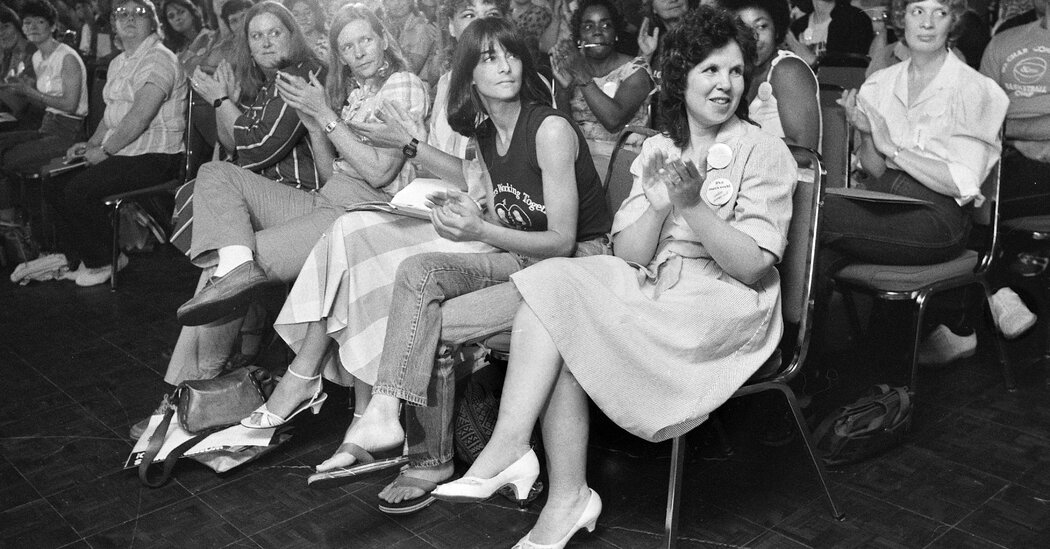Betty Jean Corridor, an ardent coal lawyer in japanese Kentucky who introduced profitable lawsuits in opposition to main coal firms for discrimination in opposition to girls, paving the way in which for 1000’s of them to safe jobs within the trade, died Aug. 16 in Cary, N.C., close to to Raleigh. She was 78.
Her demise at a hospital was confirmed by her daughter, Tiffany Olsen, who didn’t give a trigger.
In 1977, Mrs. Corridor undertook a seemingly unbelievable marketing campaign: she positioned girls in coal mines. It was a matter of easy economics for her and 1000’s of different girls in Appalachia, one in every of America’s poorest areas. A job in coal mining pays 3 times as a lot as alternate options corresponding to waitressing or instructing.
That very same yr, Mrs. Corridor based the Coal Employment Challenge in Jacksboro, Tennessee, and obtained a $5,000 grant from the muse of Mrs., who was established a number of years earlier by Gloria Steinem and others. Within the spring of 1978, Mrs. Corridor filed a criticism with the US Division of Labor in opposition to 153 coal mining firms for discrimination in opposition to girls.
By December 1978, Consolidation Coal Firm, a significant mine operator, agreed to pay $370,000 to 70 girls who have been denied jobs and to rent one girl for each 4 males.
By 1989, practically 4,000 girls had gone into the mines, in line with Marat Moorewriter of Ladies within the Mines: Tales of Life and Work (1996). In 1973 there was zero.
Earlier than submitting the 1978 criticism, Ms. Corridor later said interviewer, “we held a press convention in Knoxville, Tennessee. We had two feminine miners there with their helmets, steel-toed boots and security belts, and a lady attempting to get a job within the mine – all explaining why they did not need their daughters and sisters to face the identical issues they’d have been confronted.”
In a 1981 movie. “Coal Mining Women”, she defined: “In some communities coal is the one good paying job. It is a massive factor when a lady can truly make an honest dwelling.”
Ms Corridor rode the crest of a brand new feminism that was starting to flex its muscle mass in legislation, employment and elsewhere. However she doesn’t discuss her transformational work in ideological phrases. Relatively, her motives have been sensible.
“It occurred to me that although I had grown up in Kentucky, I did not know a single girl miner,” she instructed The New York Instances in 1979. profile.
“In fact, coal mining is tough work,” she added. “However home labor is like that, and so is working in garment factories for minimal wages. Virtually all the ladies I’ve talked to agree that if they’d to decide on between making $6,000 a yr in a manufacturing facility and mining coal for $60 or extra a day, they’d go to the mines.
However the obstacles, no less than initially, have been important. ”She took all of them on, top-notch legislation companies,” stated Jim Branscom, who within the late Nineteen Sixties employed Ms. Corridor to work with him on the newly created Appalachian Regional Fee, a federal improvement company. He later helped with early publicity efforts for the Coal Employment Challenge.
A diminutive girl, Mrs. Corridor may nonetheless be a commanding presence.
“She was barely 5 toes tall, however she simply stood tall within the courtroom,” Mr. Branscom stated in an interview. “She was simply fully fearless. The coal firms have been completely amazed. This had by no means occurred to them earlier than. The affect was a lot greater than jobs.”
Mrs. Corridor’s efforts had an excellent social impact within the area. “Ladies going into the mines helped make Appalachians a part of a number of the constructive issues that have been occurring round girls in America on the time,” stated Kip Dawson, social activist and a buddy of Mrs. Corridor who spent 13 years within the mines. “For her, opening the door to girls within the mines was a private campaign.”
Ms. Corridor piloted the Coal Employment Challenge till 1988. The group itself lasted till 1996; by then, because the trade died down, the necessity for it had diminished. Alongside the way in which, she holds conferences for girls miners on coaching, security and sexual harassment within the office. And she or he received awards for neighborhood service.
In 2001, Ms. Corridor was appointed as an appellate choose for the US Division of Labor’s Advantages Overview Board. She later grew to become chief justice, then president of the board, retiring in 2019.
Betty Jean Corridor was born on July 12, 1946, in Buckhorn, southeastern Kentucky, to Jim Corridor, a trainer, and Lillian Corridor. She attended faculties in Buckhorn and close by Berea and majored in historical past at Berea School, the place her father was head of the woodworking division.
She obtained her legislation diploma in 1976 from Antioch Legislation Faculty in Washington, DC. Antioch was a brand new college the place “you needed to someway show that you simply had an activist background,” Ms. Corridor stated in 2022 in an oral historical past interview with West Virginia College. By 1979, after the founding of the Coal Employment Challenge, she had “introduced historic change to the trade,” The Instances reported.
Along with her daughter, Mrs. Olson, Mrs. Corridor is survived by her son, Tim Corridor; two grandchildren; and a sister, Janet Corridor Smith.
“My mom believed within the underdog,” her daughter stated. “She gave up an costly authorized profession to assist the underprivileged.”
Alain Delaquerier contributed reporting.

